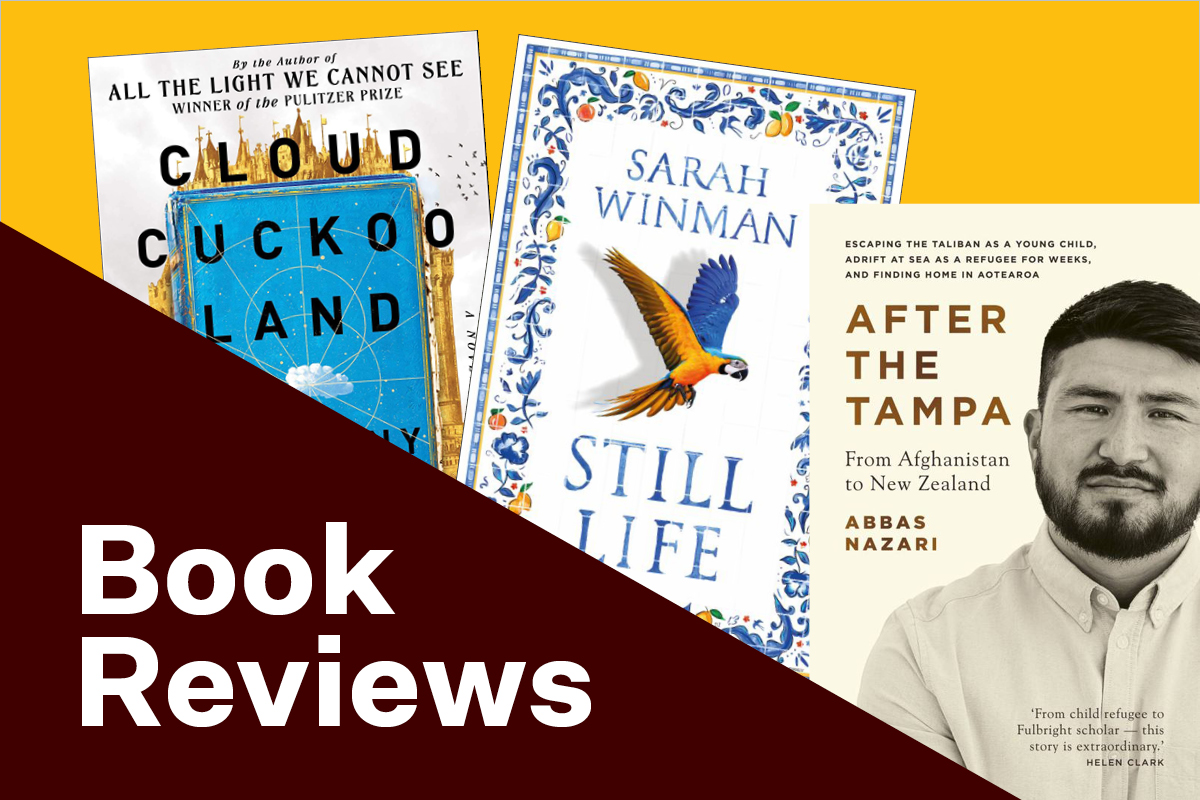It looks like it might be a while before we get to travel, right? Wrong!
As Anna Quindlen says, “Books are the plane, and the train, and the road. They are the destination, and the journey, ” and she should know. She won a Pulitzer prize and everything.
I’ve been reading a few tomes that have taken me right out of the Bay, into the past, other presents and even the future. It’s been great and I invite you to join me. Haere mai.
Anthony Doerr won a Pulitzer for All the Light We Cannot See. Gosh it was beautiful. How do you follow up such an achievement? With a huge, chunky, 640-page beauty of a novel called Cloud Cuckoo Land. We could argue that we’ve all been there this year, but in this book Doerr conjures up several, related worlds. It hinges around an ancient text by Antonius Diogenes (bit of authorly hubris – why wouldn’t you?) that we read snippets of as we go along, in which a shepherd wishes to be turned into a bird so he can fly to a land of plenty.
Traveling through the story we meet Anna and Omeir in 15th century Constantinople and face poverty, war, discrimination. In the 2000s we hang out with old fella Zeno as he guides a group of children through a stage play of Diogenes’ story, and live his whole life with him: orphan, soldier, translator. In the future, we zoom through space with Konstance, and access the ship’s virtual library with her as she tries to figure out what has happened not only to her family, but to the whole of humanity.
Once you’ve read Cloud Cuckoo Land you will have sweated in the Korean War, made friends with an owl, run through the mountains of Bulgaria, been inside the minds of the most intricately crafted characters trying to fathom what the hell is going on in our beautiful world. You can do it in a week of reading too, so it’ll be just as if you’ve been on holiday, but without having to sit next to strangers on a plane.
If there was ever a novel to get you making pasta from scratch and desperately trying to source a bottle of grappa, it’s Still Life by Sarah Winman. Oh, how I love this book.
We begin with young Ulysses Temper, British soldier. At the end of the second world war he happens upon an art historian, Evelyn Skinner, who always looks ten years younger than she is, which she puts down to cold water swimming. They are in Italy. They bond, as humans sometimes do, then go their separate ways.
Post war, Ulysses returns to his old haunts in the East End of London to find his wife, Peg, has had a child (not his), the pub’s beloved parrot Claude has been so traumatised by the Blitz that his feathers have fallen out, and his old mate Cress is spending a great deal of time communing with the street’s cherry tree.
There are so many layers to this story, so many people to love. Peg is struggling with ‘the kid,’ Alys, waiting for her American G.I. to return to her. Ulysses steps in, his love for sassy, spiky, kind Peg big enough to encompass wee Alys. Cress potters around supporting everyone, pessimist pub landlord Col tries his best to care for his daughter Ginny and between them all they are the epitome of the bonds of unconditional love and friendship. The interactions between characters are hilarious – the bickering and the loyalty in good times and in tragedy is wonderfully entertaining.
The novel turns to Italy, Florence in particular and oh, the food, the wine, the people, the architecture. Sun yourself in the piazza, cross the bridges of the Arno, sip your grappa. I defy you not to love this book and lend it to your friends.
A note on a journey none of us will ever want to make. Abbas Nazari was born in Afghanistan and knew little about the world beyond his village. After having watched the Taliban creep ever closer, wiping out dissenters and diverse ethnicities, Abbas’s father made the desperate decision to take his family and flee their home.
The family of seven (the youngest child still a baby) travel, at great personal risk, first to Pakistan, then to Indonesia. They manage to secure passage on a boat that will take them to Christmas Island; if they can get there, and claim refugee status, the Australian government have to listen. The boat is not seaworthy and is desperately overcrowded. It manages to just about make it through a terrifyingly violent storm, and then drifts.
Against all odds, a Norwegian cargo ship, the Tampa, comes to their aid and after some confusing conversations with the Indonesian and Australian authorities, and negotiations with the refugees, the Captain heads for Christmas Island. What happens then is such a travesty of human rights abuses that it’ll leave you fuming.
How Abbas and his family survive, are accepted into Aotearoa by Helen Clark’s government, and eventually thrive will leave you gob-smacked, inspired, ashamed at the racism, warmed by the kindness. Abbas’s book is called After the Tampa, and it’s incredible.
Thank goodness we live in paradise, and when we get the feeling that the grass is greener on the other side but can do little about it, we have books, and they are, as Stephen King says, ‘a uniquely portable magic.

